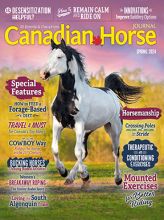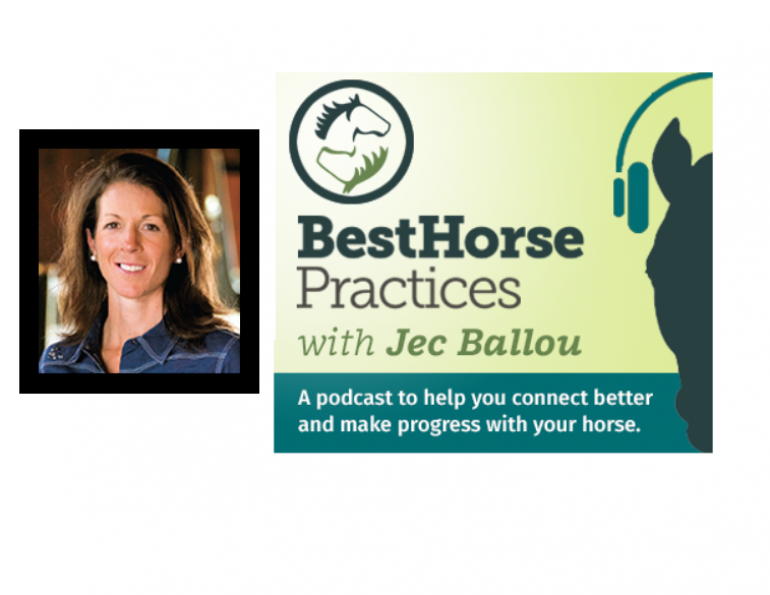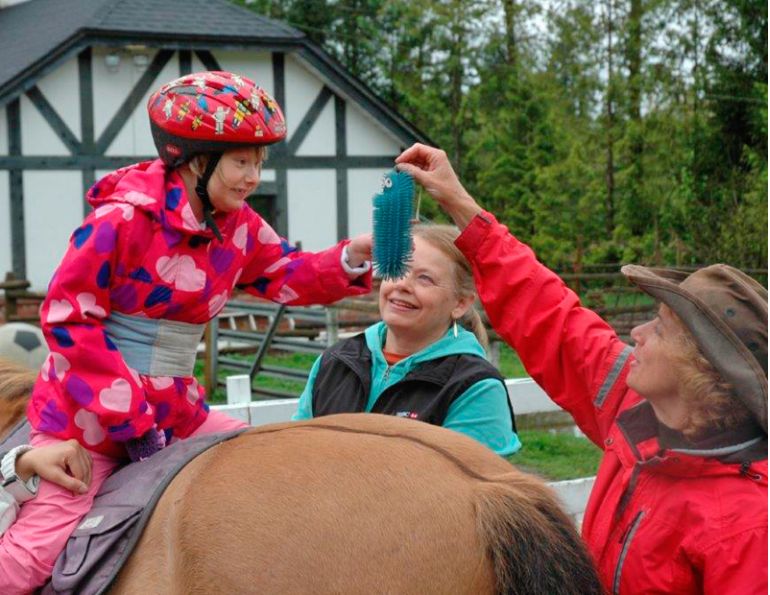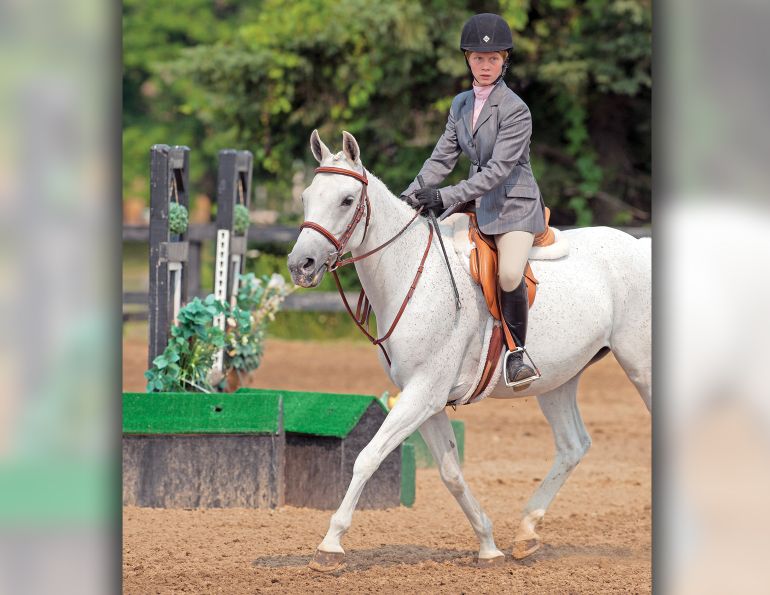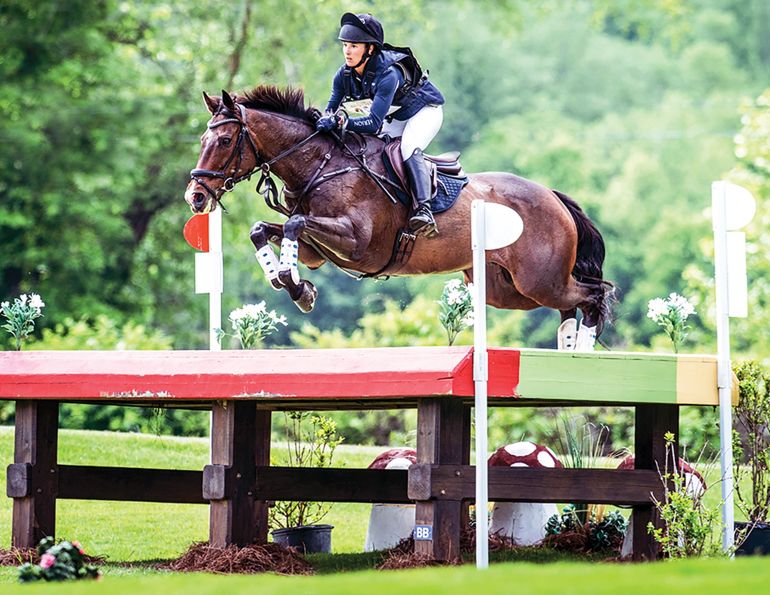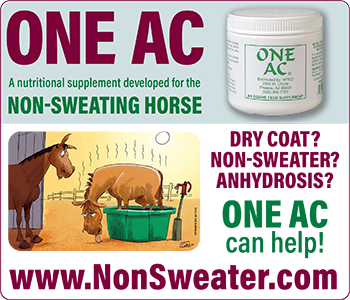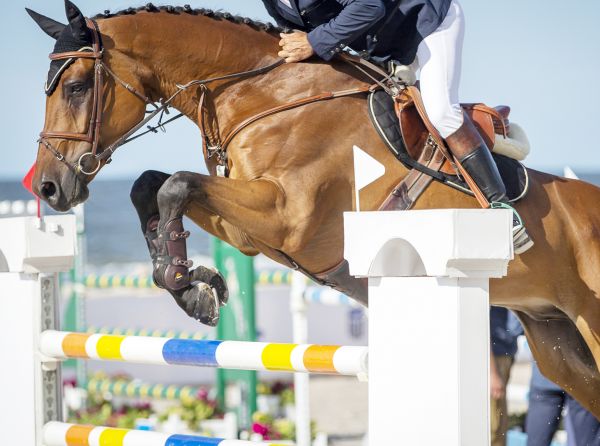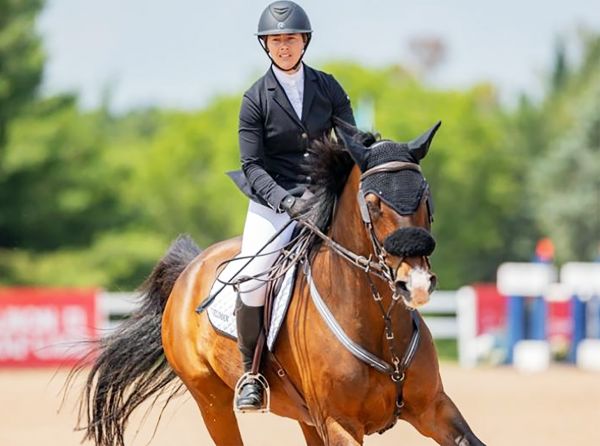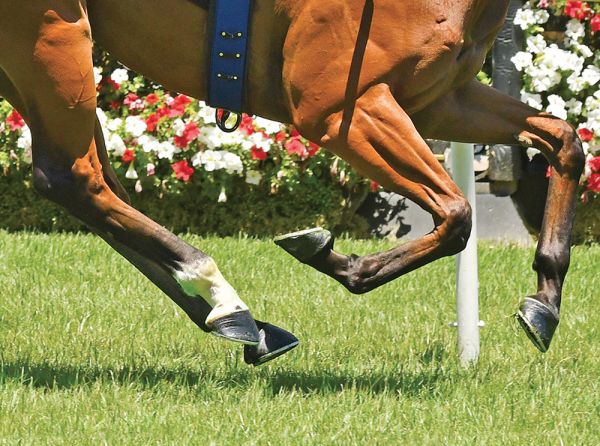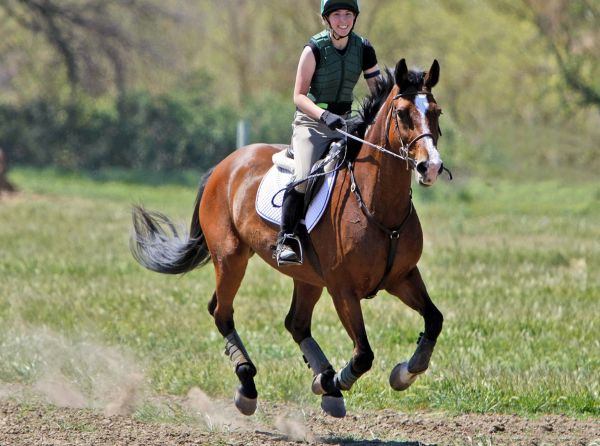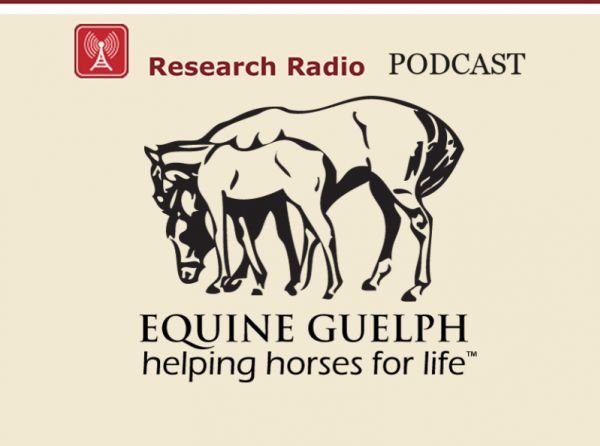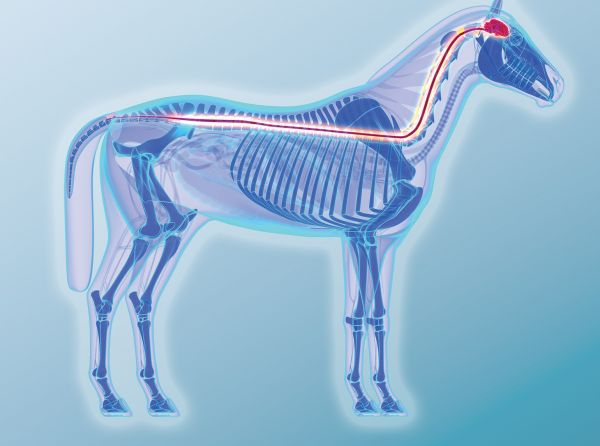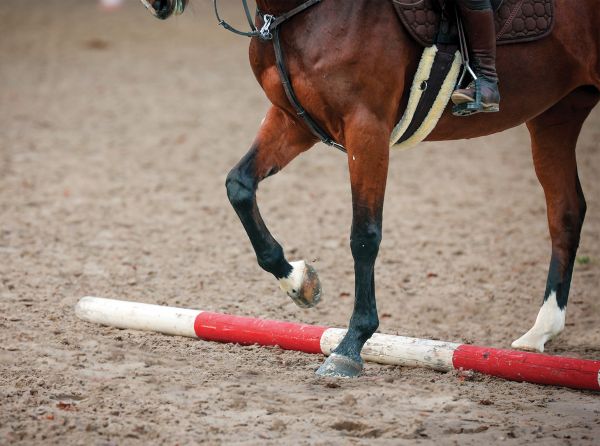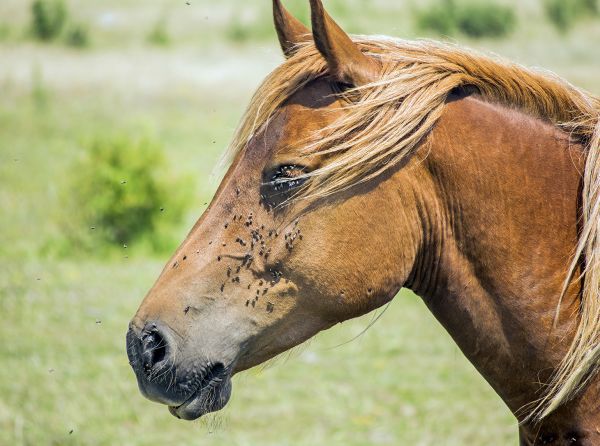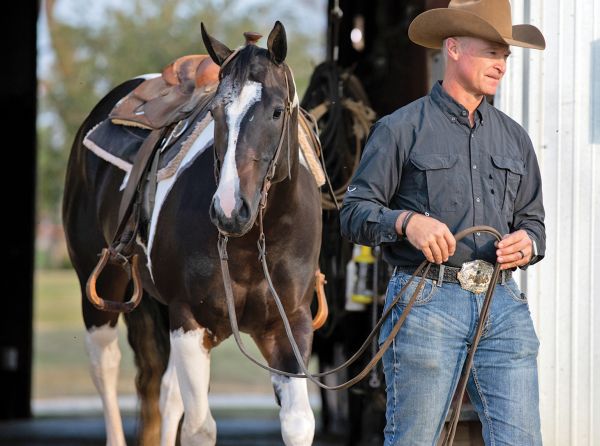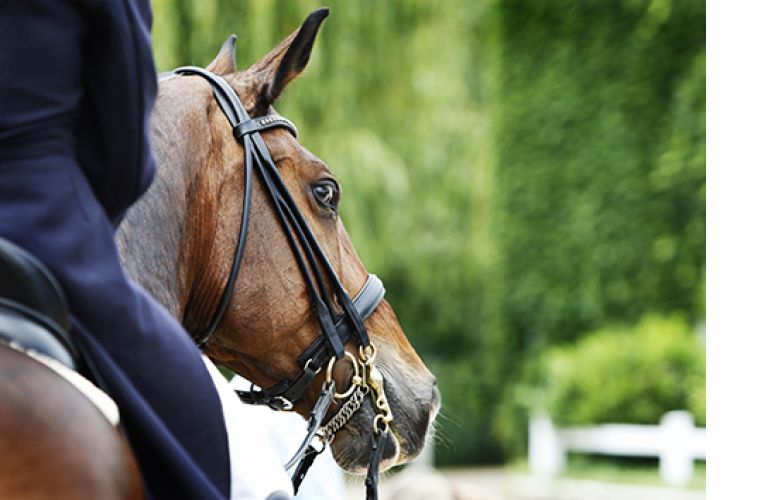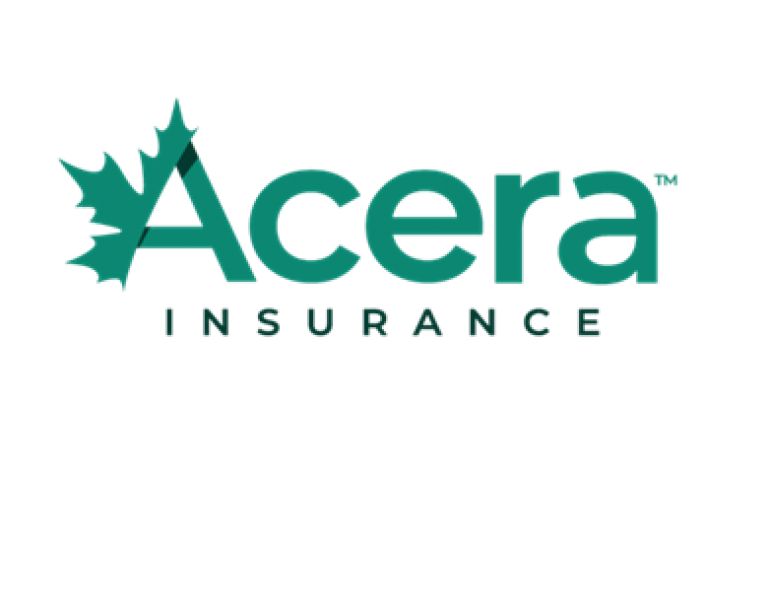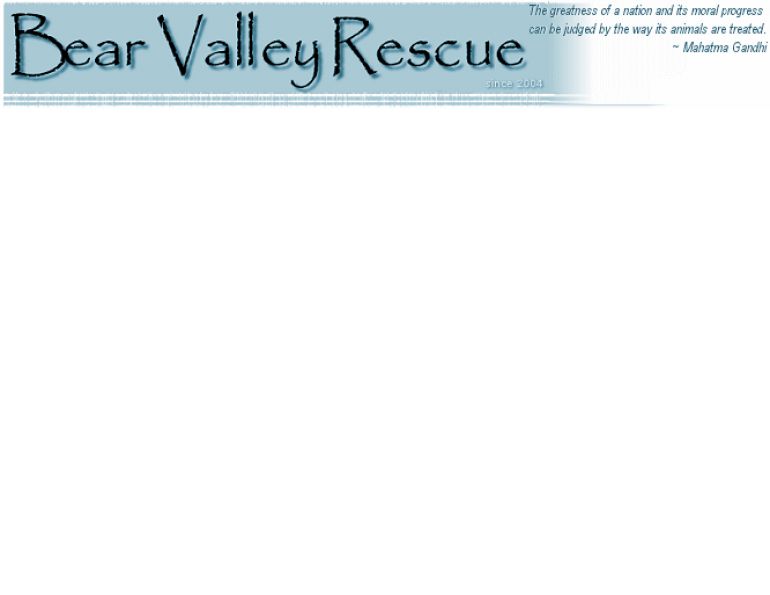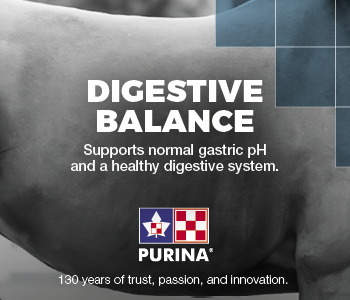By Jess Hallas-Kilcoyne
Many of us have fantasized about a career with horses, and these days your options go far beyond riding coach, trainer, or equine veterinarian. Here are profiles on five professionals who combined their love of horses with other interests and ended up in rewarding, enjoyable careers in the horse industry.
Equine Farrier
Ben Yager
For Ben Yager, a prominent equine farrier based out of Victoria, BC, his career path was decided by his love of riding, and his desire to provide exceptional foot care for the animals he describes as “amazing horses that we ask so much of.”
In Yager’s own words, a farrier “provides timely and appropriate care for a horse’s hooves.”
This care includes “trimming of the horse’s feet so they don’t become too long, distorted, or cause the horse some form of lameness. [A farrier] also provides the client or vet with important information regarding the horse’s foot health and conformation…and is also responsible for the application of either store bought shoes or custom handmade shoes for the horse.”
A farrier has to work closely with both the horse’s owner and its veterinarian to provide optimal hoof care.
For Yager, the most rewarding part of his job is “seeing that horse that was walking lame leave and walk away sound after a shoeing or several remedial shoeings. It gives me great satisfaction knowing that all the years of little hints, tips, and tricks other farriers have given to me, or that I have picked up from a clinic or seminar, just helped me fix a horse and keep my client happy.”
“There are many schools around the world that offer farrier schooling [ranging in length] from two weeks to two years,” says Yager. “We have a great one in Cloverdale, at Kwantlen Polytechnic University [taught by Gerard Laverty], and at Olds College in Alberta [taught by Dean Sinclair].”
“The skills needed to be a farrier are taught in school, but a lot of it is also taught by job experience and being out in the work field, watching and learning,” he continues. “It takes about five years to successfully learn this trade to an efficient level.” And Yager would know. After attending Montana State University he served a four year apprenticeship with Certified Journeyman Farrier (CJF) Alex Bolz. Upon becoming a CJF himself, Yager went on to serve subsequent apprenticeships in England, Scotland, and Wales, as well as a seven year apprenticeship with five time World Champion farrier, Bob Marshall. “I always recommend that people find a certified farrier in their area and do a job shadow prior to signing up for a course; it allows them to become more grounded in their endeavour to decide if this job is right for them,” Yager advises.
Yager also cautions that a farrier has to be physically fit to perform his job, emphasizing the importance of safety when working in such close proximity to large, powerful horses.
“Safety is a massive priority with my job, and that is the reason I never work alone or have my apprentices work alone.”
The less appealing aspects of farriery include working outside in poor weather, and long hours. Yager estimates that, depending on whether his equine clients require a trim or shoes, he can fit 8 to 12 horses into an average day. “Some days we have done up to 15 to 21 horses shod all the way around, making for a long day.”
However, Yager remains positive about his career choice, saying, “I love my job and can mould it any way that suits me best. I am truly lucky!”
For more information on farrier schools, events, and articles, please visit the Western Canadian Farrier’s Association at www.wcfa.ca.
Ben Yager has been practicing farriery for the past decade, during which time he has won the World Draft Horseshoeing Championships in 2006 and the Canadian Horseshoeing Championships in 2008 and 2009. He loves to teach and to date has shared his expertise with nine apprentices.

Photo: Courtesy of Heather Sansom
Rider Fitness and Conditioning Expert
Heather Sansom, MA, Certified Personal Trainer
Rider Fitness and Conditioning Experts train riders to be supple and strong in their bodies to ensure the best possible riding performance. “Strength and conditioning is about setting the body up for performing well and for reducing the risk of injury,” says Heather Sansom, a Certified Personal Trainer and Rider Fitness Expert in Kemptville, Ontario.
Many elite equestrian athletes, such as three-time Olympian in dressage, Steffen Peters of the US, train with fitness specialists. However, fitness and conditioning programs are not just for the competitive rider.
“The vast majority of the people that I work with are not elite athletes,” says Sansom. “I work with the amateur rider that doesn’t have the opportunity to ride more than two to four times a week and they need to keep their fitness up. For the non-competitive rider it means enjoying your ride more.”
“Or I get a competitive rider who realizes that their body is starting to break down due to repetitive strain injury,” Sansom continues. “Strength and conditioning also help someone coming back from an injury.”
While Sansom’s main services consist of one-on-one sessions and clinics, today’s technology also allows her to help riders via the internet. “People post videos of their ride and I’m able to give them feedback. We use Skype and we analyze what they need out of their unmounted training…it’s almost as good as working with someone face to face.”
In addition to working directly with clients, Sansom also does a great deal of writing for assorted equine publications, and is the author of several eBooks on rider fitness.
Sansom says she stumbled into this career. “I identified what my passions were…I’d always been really into functional fitness and I had been riding for almost 30 years. I realized that there was a niche.”
Sansom’s advice for people considering embarking on this career path is to get certified as a personal trainer. “The best thing to do is go with the most credible program you can find. You really need the accountability of broad standards and practices. In Canada, national certification is offered through YMCA and CanFitPro.” Sansom also recommends a degree in kinesiology to gain a strong understanding of how the human body works.
“You need to do a lot of reading…and as much learning as possible,” continues Sansom. “I have to know a little bit about pilates. If someone goes to pilates, I need to be able to help them with that…I need to know enough about endurance and conditioning.”
Specific challenges related to being a fitness specialist include managing the business end of things. “If you’re self-employed, you probably spend only 20 percent [of your time] doing what you love; the other 80 percent is spent [on business affairs] allowing you to do what you love”, warns Sansom.
Nevertheless, Sansom says she has no regrets about her career choice. “Whenever I’m coaching, speaking, or writing, I’m happy. Go with it if you’re grabbed with the passion for it. I realized that I was never going to be a Level 3 coach, and I was never going to be an Olympic athlete…you can still contribute to helping riders with their goals.”
Heather Sansom is the author of rider fitness eBooks Complete Core Workout for Rider, and a regular columnist in several equestrian publications. EquiFITT.com offers rider fitness clinics and workshops, Centered Riding® instruction, and convenient distance eCoaching for riders anywhere.

Photo: Courtesy of Arista Equestrian
Manager of Riding Apparel Company
Frann MacLean, co-owner of Arista Equestrian
It’s not the first career that many horse people would think of when considering working in the horse industry, but Frann MacLean, co-owner of Arista Equestrian loves her job as Managing Director of the equestrian riding apparel company.
“There are three of us who co-own Arista Equestrian [Gail Gordon and Catherine Murray are also co-owners], and we are all involved at different levels,” MacLean says. “As the Managing Director of the company, I lead the development of our strategic planning as well as managing day to day operations. In other words, I’m a jack of all trades!”
“On a daily basis I spend my time procuring fabrics and notions for our garments, liaising with the plants in Vancouver and Victoria, BC, where Arista is manufactured, managing our office staff, and, of course, talking with customers,” MacLean explains.
“I spend a lot of time analyzing the equestrian market trends, our brand trends, and even what the trends are in other industries where athletes train and compete. A lot of time is spent researching colour, style trends, and athletic fabric trends, sketching concepts, sampling fabrics, and manufacturing prototypes.”
MacLean, Gordon, and Murray purchased Arista in 2009 and experienced a steep learning curve. Early management plans took into account such factors as the US and Canadian economies, the high Canadian dollar, and the introduction of the HST. A fire was also responsible for the loss of an entire warehouse worth of fabrics. “Fortunately we have bounced back,” says MacLean, “and business has been growing steadily.”
Arista’s continued success since MacLean’s involvement in the company is due in large part to 15 years of sales and marketing experience, a degree in commerce, and the horse industry knowledge gleaned from her own riding experience and from running an equestrian centre on Vancouver Island, BC.
“You definitely need to love people, horses, and of course, clothes. I think you have to be good at multi-tasking, as the job demands something new every day…you also have to be forward thinking and not afraid to try something new,” MacLean says of her job. “I equally love the design process, which is really exciting, and talking to our customers, which is really inspiring, informative, and encouraging.”
Frann MacLean is the co-owner and Managing Director of Arista Equestrian, a line of equestrian riding apparel. Arista boasts fabrics and designs that are stylish, flattering, comfortable, and functional for both recreational and competitive riders. For more information on Arista Equestrian and the products they offer, visit www.aristaequestrian.com.

Photo: Courtesy of Gayle Ecker
Director of Equine Guelph
Gayle Ecker
“A ‘lifetime student of the horse’ is one of the most worthy goals for any of us in this industry,” says Gayle Ecker, Director of Equine Guelph and one of the key figures behind its inception. “We could spend several lifetimes studying the horse and there would still be much more to learn to support the health and well-being of our equines.”
Equine Guelph, at the University of Guelph, offers “an extensive equine education program for the industry from young children to adults, from the recreational rider to the industry professional,” Ecker says. Certificates in subjects such as Equine Science and Equine Business Management, as well as online courses, and workshops and seminars are all offered by Equine Guelph. Research into equine diseases and common ailments is also conducted in hopes of improving the health and welfare of horses. “New knowledge is always needed for any industry and this is so true for the horse industry,” says Ecker.
As Director of Equine, Guelph Ecker develops and oversees the programs at, and the mission of, Equine Guelph, which is “to promote ‘all things equine’ at the University of Guelph,” says Ecker. “I also oversee and coordinate meetings with our equine industry to facilitate the funding of programs such as our Equine Research Program.”
Ecker credits her love of horses with leading her to this career. “I grew up with horses and have had experience and exposure to virtually every sector of the horse industry in some way.” Ecker supplemented her interest in horses with a thorough education. “My undergraduate degree was in exercise physiology, followed by my teaching degree and then my Masters degree. Each part of this background has served me well in this position and enabled me to help develop programs in service to the industry.”
Ecker was initially hired by the former Equine Research Centre at the University of Guelph because of her experience in exercise physiology, teaching, and horse training. This developed into a research assistant position, and she became part of many teams doing research with nuclear medicine, respiratory medicine, etc. “I was very fortunate as my research led to fascinating trips to equine competitions and events in France, Dubai, Spain, Australia, New Zealand, Kentucky, and elsewhere,” Ecker says.
When the creation of Equine Guelph became a possibility, Ecker developed a proposal for a continuing education program for the equine industry. “As a trained educator and lifetime horse owner, I wanted to ensure that the knowledge generated by the research was translated into practical applications for the owner to support horse health and welfare.” Ecker was promptly hired as Senior Manager (a position which evolved into Director) of the newly formed Equine Guelph.
Ecker loves the positive feedback she receives from students who have gained knowledge of how to better care for their horses. “I love meeting people in this industry who are so passionate about the horse and the industry,” says Ecker.
The more difficult aspects of her position include witnessing welfare issues for horses, but Ecker remains positive. “We need to do more as an industry to support equine welfare…we need to keep working together to help solve shared problems,” she says. “We have many challenges in our industry, and having the whole industry working together as a unit for future sustainability and success is an important aspect of Equine Guelph.”
Equine Guelph, established in 2003, was formed in large part due to the efforts of Gayle Ecker, who has acted as Senior Manager since its inception, and is also an instructor there. She is responsible for the development of the Equine Science Certificate program as well as the creation of the “pyramid of education” model, an approach that aims to provide learning pathways for all levels of career development.

Johnson arranged the purchase of Catani by Foxstone Stables of Duncan, BC. Catani has won many championships in the Pre-Green and First Year Green Hunter Divisions in BC, Washington, and California. Photo: Courtesy of Norah Ross
Sales Agent
Desiree Johnson, Johnson Horses
If you enjoy travel and meeting new people, and the idea of playing matchmaker to horses and riders appeals to you, then the career of equine sales agent may be for you.
Among other tasks, a sales agent sources out suitable horses for clients, negotiates the price of the horse, and puts the client in touch with a qualified vet to perform a pre-purchase exam. “From there I have to ensure that all payments are made and that all export arrangements are made,” says Desiree Johnson, originally from BC who now lives and works in Europe as an overseas agent to some of North America’s best known riders and trainers.
“The most important part for me is to be my client’s eyes…in general, they need me to find the raw talent or suitable animal and get them the WHOLE story,” Johnson continues. “I always try to report every detail, both good and bad, even when I know it might cost the sale. They make the decision after that. That is why I never try to talk my clients into a horse.”
“You cannot really have training for the job. It is a lot of instinct and people skill which you have to learn,” Johnson says. However, you can prepare for a career as an agent by having a thorough knowledge of how to judge the quality of a horse, both in terms of physical and athletic ability and temperament. Keeping up to date with the horse sales market and industry is also a must, in order to fairly assess the market value of a horse.
While being a sales agent may seem like a glamorous job, there are many challenges associated with it. Johnson lists the main challenges she faced as “starting a business in a foreign country, being a woman in a predominantly male business, and dealing in several different languages. The financial challenge is also a big one. Not only do you need to fill a stable with product (horses), but [you need to] rent a stable and lorry. The monthly running costs just to get a business off the ground are huge, not to mention the costs that are required to keep the business going on a month to month basis.”
Johnson’s least favourite part of the job by far is receiving phone calls from a dissatisfied or unhappy client. “I am thankful this doesn’t come often,” Johnson says. “But with every precaution (trial, vetting, etc.) things [can] still go wrong…I really try to be there for my clients and we solve these things together. In this business there is always risk.”
That being said, Johnson also says that the most rewarding aspect of her job is “the phone call of a happy, satisfied client. There is no greater reward or better feeling…that is truly great!”
“It is a lot of hard work, late nights and early mornings, as well as a lot of blood, sweat, and stress…but the highs are so high, I wouldn’t trade my work for the world.”
Desiree Johnson owns and operates Johnson Horses, an overseas sales agent, assisting riders find their dream horses. Her clients are primarily from North America. She has found and facilitated the sale of many horses which have gone on to have extremely successful careers in international equestrian competition. Please visit www.johnsonhorsesgmbh.com for more information.
Main article photo: Courtesy of the Calgary Stampede
This article originally appeared in the February 2012 issue of Canadian Horse Journal.


